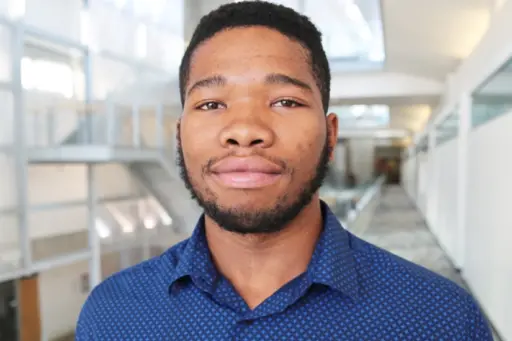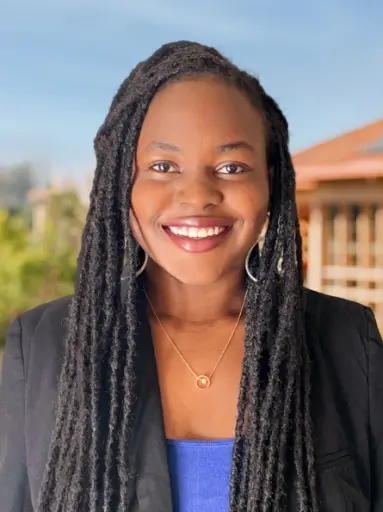The King-Morgridge Scholars program, which was made possible through the generosity of the King and Morgridge families, endows six scholarships each year to enterprising, creative young adults committed to poverty alleviation. Participants are selected from countries in Africa, Latin America, South and Southeast Asia, and the Caribbean.
Four years ago, the first cohort of King-Morgridge Scholars arrived at the University of Wisconsin-Madison intent on pursuing degrees and experiences that would ultimately benefit their home countries. Now, as the first four scholars prepare to graduate, they reflect on opportunities, challenges, what meant the most to them about being part of the program and the UW–Madison community, and of course, what they see as they look toward the future.
Two of those scholars — Chumani Mokoena and Cheryl Mulor — are graduating with engineering degrees.
Chumani Mokoena, nuclear engineering, South Africa
Chumani Mokoena’s time as a King-Morgridge Scholar can be characterized as one that exemplified strength, growth, and resilience. As he prepares to leave UW–Madison, Mokoena reflects on bright spots and challenges over the past four years. The journey was not always easy. Being on campus and dealing with feelings of isolation, enduring being a person of color in a prominently white region, and the loss of and separation from family back home added layers of challenge not encountered by most.
 Chumani Mokoena
Chumani Mokoena
Fortunately, Mokoena was able to overcome the obstacles through resilience and the help of friends, faculty, and a supportive family back home.
Upon graduating from UW–Madison, the nuclear engineering major will carry with him some incredible accomplishments and plans for the future. From founding a startup technology company that could change the way people across Africa access healthcare to a career in energy innovation, Mokoena is looking toward the future, while keeping himself grounded in his goal to eventually bring his lessons and experiences back home.
“I want to benefit my country,” Mokoena says. “So, it’s all about learning everything I can here and going back and implementing. This includes using my connections in the U.S. and trying to get them to help me further and develop my country as well. I feel a lot of people that leave India, Africa, and other places never go back, and they ultimately shine in the U.S.”
Mokoena has positioned his work and research to be of future benefit to Africa. He founded Imhotech Solutions alongside fellow King-Morgridge Scholar Cheryl Mulor and graduating senior Yasmine Abdennadher. They hope Imhotech can eventually modernize medical keeping systems throughout Africa. The group has teamed up with developers who are now partners on the project. They have acquired funding to develop a prototype and have sought an advisor who is a practicing medical doctor.
“I’m proud to say my two female co-founders are of African descent themselves,” Mokoena says. “We encompass a range of experiences but also different sets of expertise. What is interesting is that none of us are developers—they’re also engineers, but it’s not deterred us from trying to solve an everyday problem.”
According to Mokoena, there are several issues with healthcare in Africa, including inadequate funding, lack of equality in access, and loss of human capital to other countries that are able to compensate doctors and nurses at substantially higher levels. Another issue is medical records that are missing, destroyed, incomplete, or unavailable—this is an issue for which Mokoena sees solutions.
Mokoena outlined a common situation where if a person needs to go to the hospital, they would need to open an entirely new medical record case file because it would take too long to post or mail. However, if doctors and patients were able to access records electronically, regardless of location, speed and accuracy in providing medical services would be greatly enhanced.
“I think that maternal health is the backbone of any country’s healthcare system,” Mokoena says. “It forms the basis of a healthy and thriving population its children, and current and future mothers are well cared for by the system in which they are eventually going to contribute via their taxes.”
While working on Imhotech outside of the classroom, Mokoena continued to focus on his nuclear engineering major, considering the impact that innovation in the energy sector could also create lasting change through combating energy shortages.
“It’s an industry in which we need quite a lot of innovation,” Mokoena says. “I’m a nuclear proponent, and I think it’s the most complicated energy system to pursue. To work yourself up in this world as a nuclear engineer you have to be competent in chemical engineering, mechanical engineering, and electrical engineering as well.”
As he advanced in the College of Engineering, Mokoena found a valuable supporter and mentor Professor Emeritus Michael Corradini, an expert in mechanical and nuclear engineering.
“There’s few mentors as good as Professor Corradini,” Mokoena says. “He is a premier nuclear safety expert in the world, but he is just so understanding of you and so responsive to the student and really takes time to try and learn about you as a student and your background. I felt blessed with my experience.”
It was through the support of Corradini that Mokoena applied for and was selected for a prestigious internship at Idaho National Laboratory. Mokoena will pursue his graduate studies in nuclear engineering at MIT, where he was accepted and will attend in the fall on a full scholarship.
“The kinds of things that have come out of MIT and the level of intellect in terms of the things that afforded humanity, are often taken for granted,” Mokoena says. “I think being there and walking the same halls as scientists who have created things that have changed the world for better or for worse, is something I simply just could not pass up.”
He remains grateful for this support and to the Kings and Morgridges, who made the opportunity possible.
“When someone sponsored my education in South Africa, I got to go to an international school—an American international school. From there, I was able to dream about going to the U.S., and it finally happened,” Mokoena says. “Now, I get to go to a school that I didn’t think I’d go to, and that is not to say that I didn’t put in the work I did. I think it’s that the opportunity would otherwise never have been there had it not been for a few individuals who felt like they wanted to do something for those that don’t necessarily have the means to do it themselves. I am really grateful to those two families in particular.”
Cheryl Mulor, civil and environmental engineering, Kenya
 Cheryl Mulor
Cheryl Mulor
Cheryl Mulor, who majored in civil and environmental engineering, seeks to better the world around her. Whether she is tutoring fellow students or looking toward a future where she creates new buildings and infrastructure, Mulor seeks possibilities and encourages others to do the same.
That attitude may best explain her interest in engineering. Growing up in a small, rural town in western Kenya, it was typical for her to see underdeveloped infrastructure. But where many would simply see what is, she began thinking about what could be.
“Seeing that, I began imagining what civil engineering is about, and that drove me to pursue it,” Mulor says. “I thought that by studying this that maybe I will be able to come back here one day and design roads and buildings. I hope that still happens one day, but I still hope that I’m able to, in some way, give back to my community, whether through that or another program.”
When considering universities for her undergraduate studies, Mulor had several to choose from. But ultimately the reputation of the UW-Madison College of Engineering and opportunity to join the first cohort of King-Morgridge Scholars led her to decide on UW–Madison. Looking back on that decision as she prepares to graduate, she knows she made the right choice.
“I have come to greatly appreciate that decision ever since I came here, because of how the engineering program is structured, and how intimately we get to know our sponsors,” she says. “That is something I really appreciate, that someone who is giving this huge generous gift for you to attend an institution like this still takes the time out of their schedule to get to know you personally.”
Taking classes in the College of Engineering affirmed her choice to pursue civil engineering. Mulor relished the coursework, interacting with faculty, and researching the field. She even sought first-hand experience through a summer internship during her sophomore year as a project intern at CG Schmidt, where she worked under the guidance of a project manager who was working on seven different remodeling projects.
Additionally, Mulor found outlets for her desire to teach and share knowledge. Having tutored elementary school students and her siblings while a high school student, she was eager to continue in Madison. During her first semester she volunteered as a math tutor at East High School through the Morgridge Center for Public Service. Following this, she became a tutor for the Undergraduate Learning Center in the College of Engineering, helping fellow students understand and apply concepts she had already learned in her courses. For Mulor, tutoring was primarily an outlet for something she genuinely loves doing, but she noted additional benefits.
“Tutoring was also a way for me to keep the content that I had learned in those early classes fresh in my mind,” Mulor says. “Being able to teach that class, keeping it fresh in my brain, and of course, being able to help other students who were struggling with their classes and needed a little bit of assistance to get to where they wanted to.”
Following graduation, Mulor will enroll at Stanford University, which she toured while visiting the Morgridges. Mulor has been selected as a recipient of the prestigious Knight-Hennessy Scholars Program, which will support her continuing studies on sustainable design and construction.
Beyond Stanford, Mulor hopes to see several goals come to fruition. She still plans to be a part of Imhotech, a medical documentation technology startup founded alongside Chumani Mokoena, knowing the profound impact it could have to increase access to healthcare in Africa. She also hopes to one day start her own construction company in Kenya, through which she can build and improve much needed infrastructure.
In the meantime, she continues to take advantage of every opportunity that comes her way and hopes fellow students and future King-Morgridge scholars will do the same.
“To future King-Morgridge scholars and students, go for whatever you want to do,” Mulor says. “It’s kind of limitless for all of us. Whatever you think you want to do, however unachievable it might seem, you never really know until you try it. I think I’ve learned that this last year.”
A version of this story was originally published by the UW-Madison International Division.